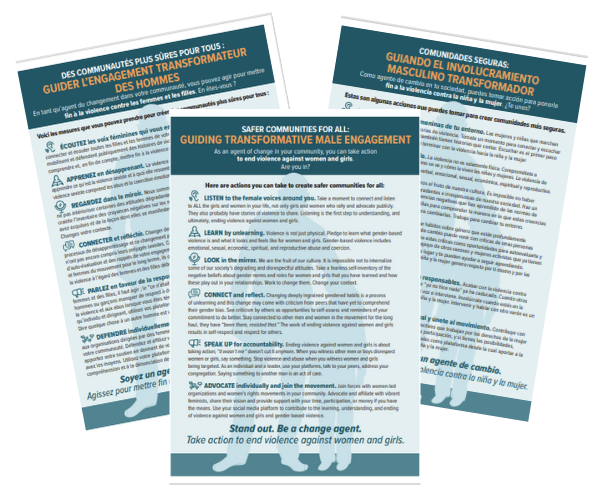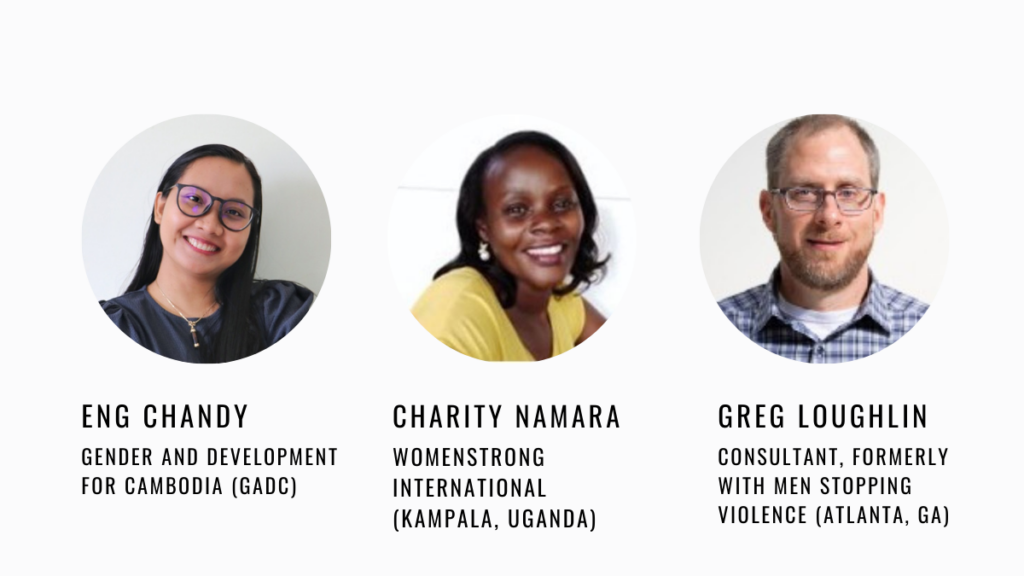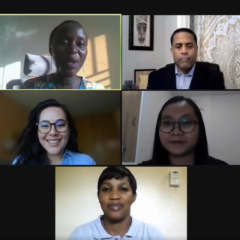Now Reading:
Go Together or Go Alone? The Power of Partnerships in Ending Violence Against Women and Girls.
March 23, 2022
A woman from Cambodia, a woman from Uganda, and a man from the United States come together on Zoom to write about dismantling patriarchy. It sounds improbable, but it is the opposite: it is a testament to the power of collaboration in ending violence against women and girls.

Violence against women and girls (VAWG) affects one in three women in their lifetimes in different forms. Tragically, COVID-19 has only exacerbated this problem – as many women and girls were forced into ‘lockdown’ at home with their abusers. At the same time, support services for survivors were disrupted or inaccessible.
Each of us knows the scale of this problem well – we have dedicated our careers to addressing patriarchal violence. As grassroots advocates, we know that sometimes we must move quickly to prevent harm. But we also know that ending VAWG will require a global movement.
This past December, as part of #16Days of Activism Against Gender-Based Violence, we came together – along with other women-led, grassroots partner organizations in our WomenStrong International (WSI) Learning Lab – to take action across 16 countries.
Here’s what we learned:
Collaboration is possible across geographic, time, language, gender and cultural differences.
At our WomenStrong-hosted Peer Learning Forum in the Fall of 2021, several Learning Lab partners suggested we all come together around a collective effort. It seemed like a daunting task, but the group had palpable energy. WomenStrong provided support, infrastructure, and encouragement, to this partner-led effort.
Partners quickly designated two co-chairs to facilitate the process and move it forward decisively. Just a few weeks later, all 18 partners rallied around the idea of elevating the critical need to engage men and boys in ending violence against women as part of the #16Days global campaign. We swiftly organized and launched a multi-lingual Facebook Live event, along with a tip sheet and complementary social media effort. The launch was more powerful because of the collaboration, and the process of pulling this together served as a great learning opportunity and morale booster.
This collective action was a professional highlight for me in 2021, and I’m still feeling the positive momentum in 2022.
Eng Chandy, Gender and Development for Cambodia (GADC)
Language justice must be prioritized.
True collaboration is not possible without prioritizing equity, access, and opportunity. Language can present a barrier to participation, excluding voices and important perspectives.
WomenStrong International supports language justice through the translation and interpretation of Learning Lab activities. Partners, too, are active participants in the pursuit of language justice. For example, partners who speak two or more languages informed and revised the work of professional translators to make our #16Days products more nuanced, authentic, and accessible for diverse local communities.
This focus on language justice meant that, in our collective effort around #16Days of Activism, we were able to hear the ideas and perspectives of all the partner organizations and then, in turn, to offer these ideas and dialogue through all our #16Days activities.

The power of community is key in ending violence against women and girls.
Community generates collective learning within a shared agenda. Through WomenStrong’s Learning Labs, we interact and engage as a community, learning both informally and formally. We engage in activities such as retreats, webinars, and informal discussions, to build a foundation premised on oneness. We rely on each other’s skills, expertise, knowledge; advanced through peer-to-peer support and learning. This enables us to share strategies, technical skills, and knowledge with our peers and across cohorts.
We can only thrive when we embrace community and lift each other up as we collaborate. This helps us to reflect on and critique our own biases when addressing critical issues such as ending violence against women and girls.
Monica Nyiraguhabwa, Executive Director, Girl Up Initiative Uganda
The power of this community-building, collective learning, and skills-sharing came into play as we organized our #16Days activities. When partners decided that a video documenting men’s commitments would be a powerful inspiration for other men who might want to get involved in ending violence against women and girls (VAWG), our video-savvy peers from Girl Up Initiative Uganda created a video. When seeking a moderator confident with live events, Girl Up’s Executive Director graciously offered her expertise. And, when one of us expressed doubts about our ability to create a collective tool for engaging men and boys, our peer Paola Saldivias, of Visionaria Network Peru, responded, “Don’t worry! You’re part of a community. We will help you!”
Of course, solidarity is not uniformity. Not every partner participated in every activity. Some provided quotes for social media, some recruited men for the video, and others shared the Facebook Live event or tipsheet across their social media channels. Not everyone did everything, nor did we need that. What we have is a commitment to a common goal – ending VAWG – and relationships and trust among our fellow partners. This is the strength of community: each partner did what they could given their current circumstances.
Ending VAWG is not a quick race, it’s a marathon – and, we have far to go. We’ve learned through our partnerships and recent collective effort, that collaboration is a critical part of this work. Everyone has something to contribute to this work. It is through these efforts that a sense of community is deepened, and responsive approaches can be developed and implemented to ultimately lead to ending violence against women and girls.
Please join us! Let’s “go together.”
Co-Authors

Charity Namara – WomenStrong International Technical Advisor – Capacity Strengthening (Kampala, Uganda)
Greg Loughlin – Consultant – formerly with Men Stopping Violence (Atlanta, GA)
Eng Chandy – Executive Director – Gender and Development for Cambodia – (GADC)

